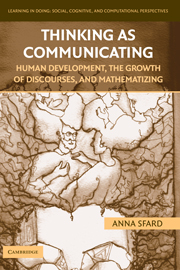
-
Select format
-
- Publisher:
- Cambridge University Press
- Publication date:
- July 2009
- January 2008
- ISBN:
- 9780511499944
- 9780521867375
- 9780521161541
- Dimensions:
- (228 x 152 mm)
- Weight & Pages:
- 0.69kg, 352 Pages
- Dimensions:
- (228 x 152 mm)
- Weight & Pages:
- 0.46kg, 352 Pages
You may already have access via personal or institutional login- Subjects:
- Developmental Psychology, Psychology, Educational Psychology
Book description
This book is an attempt to change our thinking about thinking. Anna Sfard undertakes this task convinced that many long-standing, seemingly irresolvable quandaries regarding human development originate in ambiguities of the existing discourses on thinking. Standing on the shoulders of Vygotsky and Wittgenstein, the author defines thinking as a form of communication. The disappearance of the time-honoured thinking-communicating dichotomy is epitomised by Sfard's term, commognition, which combines communication with cognition. The commognitive tenet implies that verbal communication with its distinctive property of recursive self-reference may be the primary source of humans' unique ability to accumulate the complexity of their action from one generation to another. The explanatory power of the commognitive framework and the manner in which it contributes to our understanding of human development is illustrated through commognitive analysis of mathematical discourse accompanied by vignettes from mathematics classrooms.
Reviews
'Sfard has provided us with one of the most impressive, unified, homogenous theories of learning …'
Source: Computer-Supported Collaborative Learning
Contents
Metrics
Altmetric attention score
Full text views
Full text views help Loading metrics...
Loading metrics...
* Views captured on Cambridge Core between #date#. This data will be updated every 24 hours.
Usage data cannot currently be displayed.
Accessibility standard: Unknown
Why this information is here
This section outlines the accessibility features of this content - including support for screen readers, full keyboard navigation and high-contrast display options. This may not be relevant for you.
Accessibility Information
Accessibility compliance for the PDF of this book is currently unknown and may be updated in the future.


